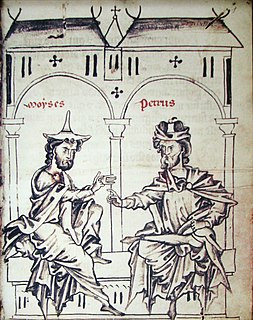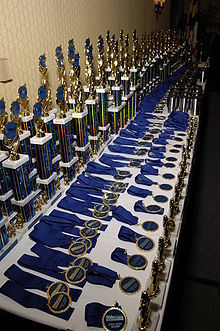
Wiley College is a private historically black college in Marshall, Texas. Founded in 1873 by the Methodist Episcopal Church's Bishop Isaac Wiley and certified in 1882 by the Freedman's Aid Society, it is one of the oldest predominantly black colleges west of the Mississippi River.

Debate is a process that involves formal discourse on a particular topic, often including a moderator and audience. In a debate, arguments are put forward for often opposing viewpoints. Debates have historically occurred in public meetings, academic institutions, debate halls, coffeehouses, competitions, and legislative assemblies. Debate has also been conducted for educational and recreational purposes, usually associated with educational establishments and debating societies. These debates put an emphasis upon logical consistency, factual accuracy, and emotional appeal to an audience. Modern forms of competitive debate also include rules for participants to discuss and decide upon the framework of the debate.
Lincoln–Douglas debate is a type of one-on-one competitive debate practiced mainly in the United States at the high school level. It is sometimes also called values debate because the format traditionally places a heavy emphasis on logic, ethical values, and philosophy. The Lincoln–Douglas debate format is named for the 1858 Lincoln–Douglas debates between Abraham Lincoln and Stephen A. Douglas, because their debates focused on slavery and the morals, values, and logic behind it. LD debates are used by the National Speech and Debate Association, or NSDA competitions, and also widely used in related debate leagues such as the National Christian Forensics and Communication Association, the National Catholic Forensic League, the National Educational Debate Association, the Texas University Interscholastic League, Texas Forensic Association, Stoa USA and their affiliated regional organizations. The vast majority of tournaments use the current NSDA resolution.
Policy debate is an American form of debate competition in which teams of two usually advocate for and against a resolution that typically calls for policy change by the United States federal government. It is also referred to as cross-examination debate because of the 3-minute questioning period following each constructive speech. Evidence presentation is a crucial part of Policy Debate; however, ethical arguments also play a major role in deciding the outcome of the round. The main argument being debated during a round of Cross Examination is which team has a greater impact. This factor alone can decide the winner of a round. Whichever team can prove the greater impact is likely to win the round. When a team explains why their impacts are "greater" than the opposition's impacts, they utilize the concept of "impact calculus." One team’s job is to argue that the resolution— the statement that we should make some specific change to address a national or international problem —is a good idea. Affirmative teams generally present a plan as a proposal for implementation of the resolution. On the other hand, the Negative teams present arguments against the implementation of the resolution. In a single round of debate competition, each person gives two speeches. The first speech each person gives is called a “constructive” speech, because it is the speech where each person constructs the basic arguments they will make throughout the debate. The second speech is called a “rebuttal”, because this is the speech were each person tries to rebut the arguments made by the other team, while using their own arguments to try to convince the judge to vote for their team. The Affirmative has to convince the judge to vote for a change, while the Negative has to convince the judge that the status quo is better than the hypothetical world in which the Affirmative's plan is implemented.

La Costa Canyon High School (LCC) is a public high school located in Carlsbad, California. Established in 1996, it is a member of the San Dieguito Union High School District and serves the communities of Encinitas, south Carlsbad, Leucadia, Olivenhain, and Cardiff. La Costa Canyon is the only school in the district to offer the International Baccalaureate diploma programme.
Public Forum debate is a widespread form of middle and high school competitive debate which centers on current events and relies on both logic and evidence to construct arguments. Invented in the US, Public Forum is one of the most prominent American debate events, alongside policy debate and Lincoln-Douglas debate; it is also practiced in China and India, and has been recently introduced to Romania. Individuals give short speeches that are interspersed with 3 minute "Crossfire" sections, questions and answers between opposed debaters. The winner is determined by a judge who also serves as a referee. The debate centers on advocating or rejecting a position, "resolve", or "resolution", which is usually a proposal of a potential solution to a current events issue. Public Forum is designed to be accessible to the average citizen.
Parliamentary debate is an academic debate event. Many university-level institutions in English-speaking nations sponsor parliamentary debate teams. In addition the format is currently spreading to the high school level. Despite the name, the parli is not related to debate in governmental parliaments beyond formal speaker titles such as "Opposition Leader" and "Prime Minister".
An urban debate league (UDL) is a group of high school policy debate teams from urban high schools in the United States. UDLs are generally located in large cities throughout the United States and work predominantly with minority students.

Westminster Senior High School is a high school located in Westminster, Maryland, United States.
Rufus King International High School, or Rufus King, is a public magnet high school located on the north side of Milwaukee, Wisconsin, part of the Milwaukee Public Schools district. The school is ranked the 1,658th best public high school in the country by U.S. News & World Report, making it the 42nd best performing public high school in the state of Wisconsin. The school offers the International Baccalaureate curriculum.
Parker School is an independent, co-educational day school for students in grades K-12 located in Waimea, Hawaii County, Hawaii. The school offers a complete K-12 college-preparatory program in separate facilities for lower, middle and upper school students.
There are several venues of competition for policy debate in the United States.
Walbrook High School formerly known as Walbrook Senior High School (1971–1998) and Walbrook Uniform Services Academy (1999–2005), was a public high school located in Baltimore, Maryland, United States.
The Bancroft Literary Association and the Carrollton-Wight Literary Society are two competitive forensic societies at the Baltimore City College and are the formal names for the school's speech and debates teams. Founded in 1876 and 1878 respectively, the Bancroft and Carrollton-Wight Societies are the oldest literary societies at a public high school in the United States. Historically, the two societies competed mainly between themselves. The rivalry culminated each year with an annual debate. In the 20th century, the societies began to compete with other secondary schools and some universities. At the time, the teams' most notable rival was Baltimore Polytechnic Institute, City College's chief rival in sports and academics. The Bancroft and Carrollton-Wight Societies disbanded for a time in the 1980s and early-1990s, but were revived in the late-1990s. Baltimore City College is a charter member of the Chesapeake Region of the National Forensics League and the National Catholic Forensic League, and is founding member of the Baltimore Catholic Forensic League and the Baltimore Urban Debate League.

The William Pitt Debating Union (WPDU) is the debating society of the University of Pittsburgh. Falling under the auspices of the Department of Communication, the WPDU is a co-curricular program and hub for a wide range of debating activities, including intercollegiate policy debate, public debate, and debate outreach. One of the oldest collegiate debating organizations in the nation, the WPDU grew from the University’s Division of Public Speaking in 1912. Throughout its history, the WPDU has regularly participated in national and international competitions, including capturing the affirmative team two-man debate national championship at the 1947 Grand National Forensic Tournament, and appearing 45 times at the National Debate Tournament, where it captured the 1981 national championship. The WPDU is located in the heart Pitt's campus and occupies the eastern wing of the eleventh floor of the Cathedral of Learning. The WPDU also offers scholarships to top team participants.

The Yale Debate Association (YDA) is Yale University's only competitive intercollegiate debate team. Founded in 1908, it is the most prolific winner of the American Parliamentary Debate Association's Club of the Year award. The YDA was also the first American team to win and have the top speaker at the modern World Championships. Currently, the YDA is the fourth-ranked collegiate debate society in the world, and the highest in North America.

The Rutgers University Debate Union (RUDU) is Rutgers University's intercollegiate debate team. Re-founded in 2001, the Union's roots extend back to the 18th century literary societies that existed at Rutgers. There have also been the tradition of King's-Queen's Debates with Columbia University when Rutgers was known under its founding name of Queen's College.
The LAMDL, a non-profit organization, is devoted to bringing debate to urban high schools in the Los Angeles area. The LAMDL is part of a “public-private” partnership, relying on financial contributions from private sources and collaboration with the Los Angeles Unified School District (“LAUSD”). LAMDL also works closely with the University of Southern California. Currently, ten high schools are active in the LAMDL. The LAMDL is associated with the National Association for Urban Debate Leagues (“NAUDL”).

The National Association for Urban Debate Leagues (NAUDL) is a Chicago-based non-profit organization that prepares low income students of color to succeed in college and in their future careers by organizing and supporting competitive debate teams in urban public schools across the country. The NAUDL engages in advocacy and fundraising on behalf of Urban Debate Leagues (UDLs), which operate at 500 high schools and middle schools in 19 cities across the U.S., including Atlanta, Baltimore, Chicago, Dallas, D.C., New York, and Los Angeles. Debate is believed to improve critical thinking skills and educational outcomes.
Competitive debate, also known as forensics or speech and debate, has a history in the United States dating back to colonial times. There are a variety of debate formats, including Public Forum, Lincoln–Douglas, Policy, and British Parliamentary. The activity also encompasses many speaking events, including Oratory, Extemporaneous Speaking, and Dramatic Interpretation. Participation in competitive debate is associated with positive outcomes for competitors across a wide variety of metrics, including standardized test scores, civic engagement, and future career outcomes.









